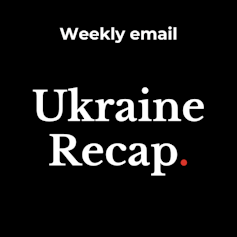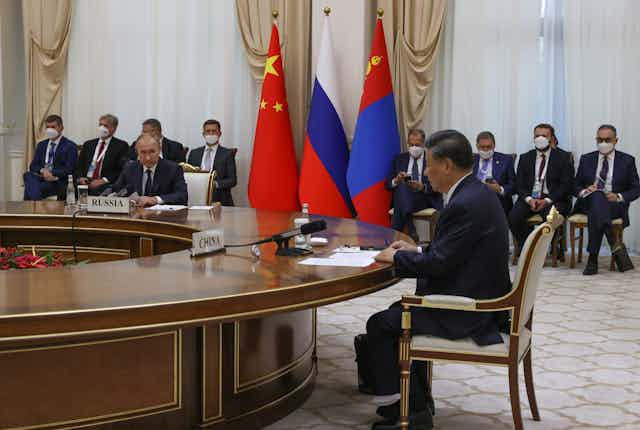While his troops struggle to regroup in the face of a lightning-fast Ukrainian offensive in the northeast, Vladimir Putin is in Samarkand, fabled halfway point of the silk road in Uzbekistan, for a summit meeting of the Shanghai Cooperation Organisation (SCO). While he is there he has a busy schedule of face-to-face meetings with various world leaders who have yet to condemn his invasion of Ukraine.
One of Putin’s key meetings will have been with Xi Jinping. Early reports say the Russian president acknowledged Xi’s “concern” about the war. But he thanked the Chinese president for his “balanced position” on Ukraine. Full details of these talks will emerge in coming days.
It’s likely the Russian president is relieved to be able get away from the Kremlin for a few days, given the pressure he must surely be feeling over the military setbacks of the past week or so. He won’t be unaware of the tone of reports in the western media that are confidently predicting that Ukraine could actually win the war.
This is a conclusion shared by Frank Ledwidge, an expert in military strategy at the University of Portsmouth, who has spent time in Kyiv recently and believes that Ukraine’s recent military success will play well in Washington, London and in other countries that have aligned themselves with Kyiv.
Weeks like this fully vindicate the massive military aid packages provided to Ukraine and will make it easier for western leaders to justify more of the same, Ledwidge writes.
Read more: Kharkiv offensive has shown the west that Ukraine can win

This is our weekly recap of expert analysis of the Ukraine conflict. The Conversation, a not-for-profit newsgroup, works with a wide range of academics across its global network to produce evidence-based analysis. Get these recaps in your inbox every Thursday. Subscribe here.
The speed with which Ukrainian troops have rolled up the Russian military in the northeast has taken everyone by surprise. The Russian military appeared to fall apart in the face of the ferocious offensive. This is in no small part due to failings in the Russian military’s command and control, which is in disarray, writes Portsmouth University’s Christopher Morris.
Morris believes that reforms introduced by Putin over the years to “coup-proof” the military, by centralising much more power in the office of president, has hampered the Russian war effort and made it harder to coordinate units in the air, on the ground and at sea.
Read more: Ukraine war: Russia's problems on the battlefield stem from failures at the top
Another indication of the apparently parlous state of Russia’s military, writes Christopher Michael Faulkner, assistant professor of national security affairs at the US Naval War College, is the use of mercenary units such as the Wagner Group. Most modern wars involve mercenaries to some degree, Faulkner says, but the increasing visibility of these units – as well as the plan to use convicts in battle – suggests that the Kremlin is running as short of ideas as it is of trained fighting personnel.
What does Putin do next?
So what’s Putin’s next move? Will he introduce mass mobilisation? Will reservists and conscripts be dispatched to Ukraine? This would be deeply unpopular and – in the case of conscripts – will require a change of the law writes Alexander Hill, professor of military history at the University of Calgary, who has weighed up Putin’s options.
Read more: What is Vladimir Putin's next move in the face of Ukrainian battlefield victories?
There are also fears that, feeling his back to the wall, Putin might choose to escalate. Matthew Sussex, a fellow in the Strategic and Defence Studies Centre at Australian National University, says the Russian president has a number of possible courses of action in addition to the ideas already canvassed here.
None of them are particularly palatable. Invading Moldova or staging a provocation against Estonia could bring the conflict a step nearer to involving Nato, while resorting to the use of tactical nuclear weapons is unlikely, but can’t be ruled out, says Sussex.
Read more: With his army on the back foot, is escalation over Ukraine Vladimir Putin’s only real option?
What do Ukrainians want?
With all the high-level rhetoric flying around over the past six months, the voices of ordinary Ukrainians have sometimes been lost. But a survey of 1,160 people in areas not occupied by the Russians which was conducted by a team of Oxford academics recently was pretty unequivocal.

Given a range of options and trade-offs, the vast majority (79%) would not countenance a Russian-backed government in Kyiv under any circumstances and no matter how many casualties Ukraine had to suffer. They felt the same way about ceding territory. In fact – and interestingly – those who said they might accept a Russian-backed government would only do do in the event that Ukraine would be restored to its pre-2014 borders.
Read more: Ukrainians are not willing to give up territory or sovereignty – new survey
One of Russia’s red lines in the lead up to the war was always the expansion of Nato into the vacuum left by the collapse of the Soviet Union in 1991. Russia has repeatedly stressed that there was an agreement between the late US president, George H.W. Bush and Mikhail Gorbachev, the last president of the Soviet Union, who died at the end of August, that Nato would not seek to sign up former Soviet bloc countries in return for acquiescing to German unification.
Nick Megoran, who researches political geographies and geopolitics of post-cold war international relations at Newcastle University, believes that the west should have paid more attention to this deep-seated Russian concern. Any future security arrangement, he believes, must take this into account.
Read more: Ukraine war: this map holds an important clue about Kremlin fears of Nato expansion
Ukraine Recap is available as a weekly email newsletter. Click here to get our recaps directly in your inbox.

